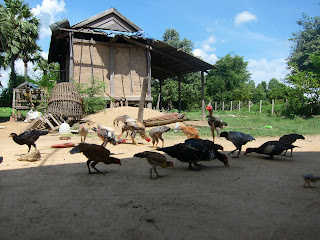
This past week I took a trip to one of the regions where The Org is operating its agricultural/nutrition program. Along with a fellow barong (foreigner) co-worker and Thida, a Cambodian program officer, I made the 4-hour car journey to Pursat province to monitor and observe various aspects of the program. Over the past month, I've read countless studies, bulletins and reports, and to see the farms in action took my breath away... Working in development, or public health in general I should say, I have often been part of programs that are innovative, exciting and that on paper should work perfectly. But in the field, whether that be New York City public schools or a village in rural India, challenges pop-up in the most unexpected places and programs have to weather these bumps in the road. So as we zoomed through the countryside, I held the picture-perfect version of the program in my head, but also kept an open, curious mind for what the challenges would be in this setting.

As we hopped out of the car and walked up to meet the first Village Model Farmer, I got a feeling in my gut that this visit was going to be different. His face stretched wide with a smile as he saw Thida, who visits all the farms each month to see how things are progressing. Thida has a background in both agronomy and management, and over the course of two years of field visits she has built an incredible rapport with each farmer. They greet one another as good friends, discuss how all the crops are coming along, and Thida gives suggestions for increasing production and planning ahead for the next season. The farmer took us on a tour of his land, pointing out different crops, animals and explaining his plans for the next planting. His farm was flourishing, with lush rows of mustard greens, morning glory, bunching onions and trellises crawling with gourd and bean vines. In another section, he showed us all the seedlings and saplings he was growing and saving, to be distributed among the other household farmers in his community. As a Village Model Farmer, he serves as a source of agricultural knowledge
 and support for the 20+ women farmers also participating in the program. If someone's sweet potato plants aren't doing so hot, they'll come to him for tips on how to turn things around. He also talks with the other farmers, most of whom are mothers of small children, about the nutrition of these crops and the benefit of including them in daily meals.
and support for the 20+ women farmers also participating in the program. If someone's sweet potato plants aren't doing so hot, they'll come to him for tips on how to turn things around. He also talks with the other farmers, most of whom are mothers of small children, about the nutrition of these crops and the benefit of including them in daily meals.
I left his farm overwhelmingly impressed by the food production, his pride in his work, and his commitment to supporting others in the village. As we moved on to visit household farmers and more Village Model Farmers in other villages, I continued to see a pattern.... Beautiful, successful garden plots, farmers beaming with pride, and women saying over and over again, "Yes, we get all our vegetables from this garden so we don't have to but at the market. And whatever is leftover we sell at the market, and then we spend this money on meat and school fees for the children." When we asked if they also spent some of the money on healthcare for the children, only a few said they did... The rest said that since they began feeding their children more fruits and vegetables they had actually been sick less often, so no, they di
 dn't need to spend the extra income on healthcare.
dn't need to spend the extra income on healthcare.
Part of me knows that I am probably still a bit naive, and haven't seen all the ins-and-outs of this program. We were visiting a program that had been operating in Pursat for almost 2 years (and the program has been in Asia for over two decades now) and there were most likely some hiccups throughout during implementation, but overall this program is working in Pursat. Numbers show increases in food production, income generation and after endline data is gathered we will see if there have also been increases in consumption of micronutrient-rich foods and improvements in child health and nutrition. The program is ending in October in this region, but every farmer we met was preparing beds for their next planting, planning their next harvest, and collecting and saving seeds for the next season... When we asked if they would continue their far
 ms after October, all responses were the same and the answer was evident in the success of these farms, the smiles and energy of the kids, and the stories of how lives had changed over the last two years, "Yes, of course we will continue."
ms after October, all responses were the same and the answer was evident in the success of these farms, the smiles and energy of the kids, and the stories of how lives had changed over the last two years, "Yes, of course we will continue."
No comments:
Post a Comment